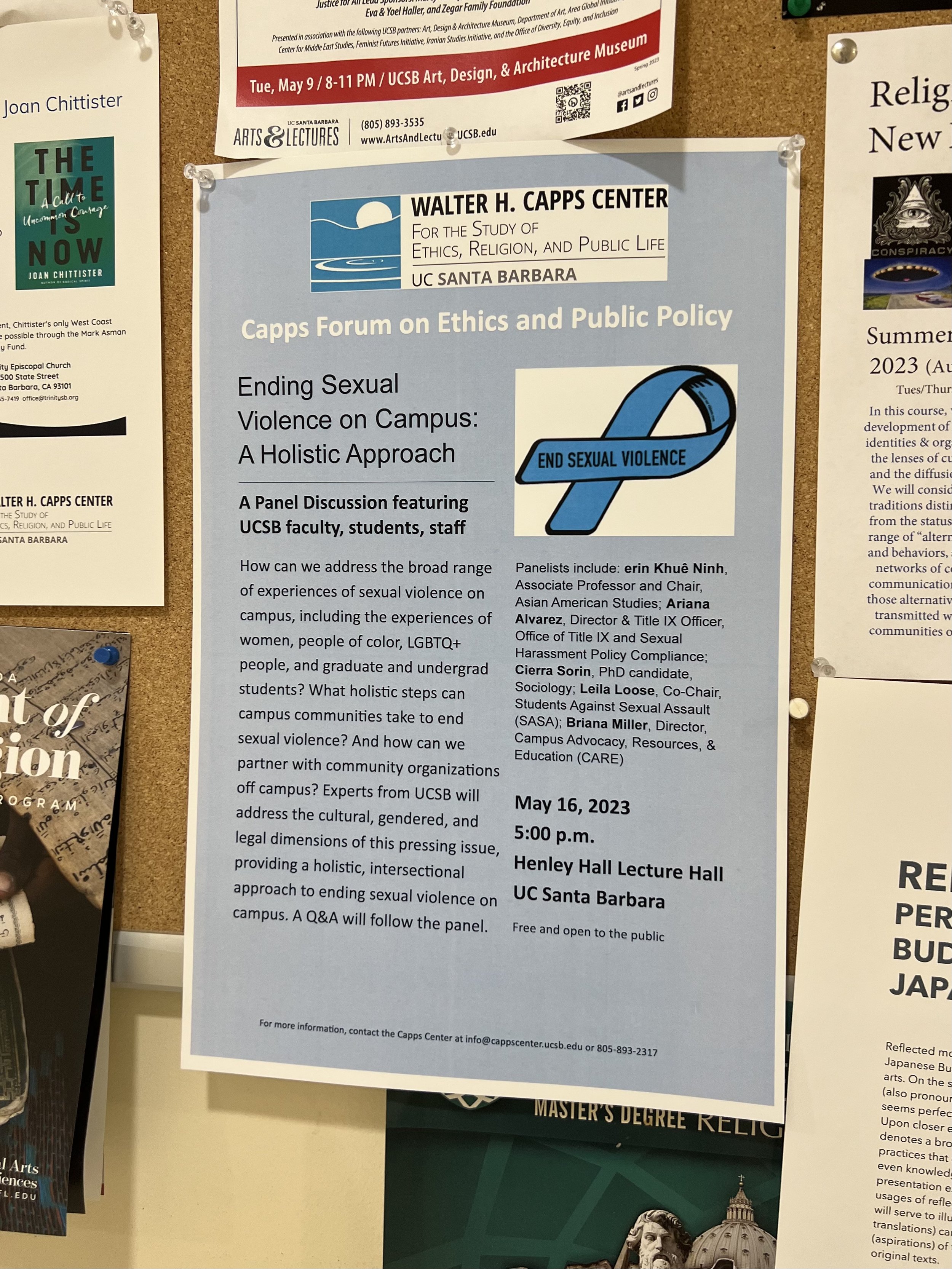By Jian Hong Shi
UC Santa Barbara staff and students can better help survivors of sexual violence heal by considering a survivor’s “multifaceted identity,” rather than taking a one-size-fits-all approach, says Ariana Alvarez, director of UC Santa Barbara’s Title IX Office.
Alvarez spoke recently at a panel discussion sponsored by the Walter H. Capps Center called “Ending Sexual Violence on Campus: A Holistic Approach.” Other panelists included erin Khuê Ninh, chair of UCSB’s Asian American Studies Department, Cierra Sorin, a sociology Ph.D. candidate, and Leila Loose, co-chair of Students Against Sexual Assault (SASA). The discussion was moderated by Briana Miller, director of UCSB’s Campus Advocacy, Resources, & Education (CARE) office.
Panelists said the experiences and identity of a survivor shape potential resolutions. Informal healing processes, or ‘alternate resolutions,’ are just as valid and useful for survivors as formal methods such as reports and criminal investigations, the audience was told. Alvarez said one survivor created pieces of art along with an impact statement that she presented to the perpetrator and ended up “very satisfied.” For Alvarez, a successful resolution means the survivor can say “I feel like I can move forward.” Expanding the possibilities for survivors to chart their own paths means following their lead, she said.
The most vulnerable group of people on college campuses are arguably graduate students, said erin Khuê Ninh, because the perpetrators are often their faculty advisors. These advisors are critical in graduate school because they sit on panels that decide whether Ph.D. candidates get their doctoral degrees. Additionally, universities often side with their faculty, said Cierra Sorin, inflicting “institutional betrayal” where students are not protected. Sorin added that this “toxic” culture within academia must change to support survivors more than perpetrators in order to create a safer campus.
Undergraduate students are also at risk of sexual violence, which is why Leila Loose and her student advocacy group engages with other student organizations to create space for people “to talk about survivorship.” By working as a liaison between undergrads and the university, SASA is helping campus responses to sexual violence stay relevant to students’ needs. For example, they conducted surveys to see how students react to the Timely Warning emails the school sends out to notify the campus community of incidents of crime, including sexual assault. Almost half of the 442 respondents reported that they were “negatively affected” by the content of the emails. To mitigate the harm caused to survivors by reading accounts of sexual violence and reliving trauma, SASA suggested the university include content warnings at the top of these alerts.
Asian American studies professor erin Khuê Ninh said, “One-third of Asian American women will experience sexual violence in their lifetimes.” She also said that there is a lot of shame associated with these experiences, partially because some survivors worry about how their careers may be affected. This fear over the future goes back to the “model minority myth” that has burdened Asian Americans for decades. The myth heralds Asian Americans as exemplars of how minorities in America should behave: obedient and subservient. But Asian American women also experience a heightened pressure for perfection. “Any kind of frailty cannot be allowed,” Ninh said. She urged those assisting with sexual violence resolutions on campus to peel back the layers of a survivor’s identity, which can reveal the complexity of their response to trauma and how to best assist them in their healing.
Moderator Brianna Miller asked the panelists “How do you maintain hope?” and one by one, they spoke about how they keep going despite the heaviness of working with trauma. Alvarez said “regular reflective practices” help her “commit [to her work] over and over.” Ninh said that she is “energized by the waiting” for potential changes within academia. Sorin said she pays attention to self-care. “I cry when I need to [and] I put the work down when I need to,” she said. Student advocate Loose ended with a phrase that motivates her: “Activism is healing.”
UCSB’s CARE office provides 24/7 crisis support, accompaniment, and resource navigation to those impacted by sexual violence. The CARE hotline is (805) 893-4613.
Jian Hong Shi is a third year UC Santa Barbara student majoring in Environmental Studies. She covered this event for her Digital Journalism course.



